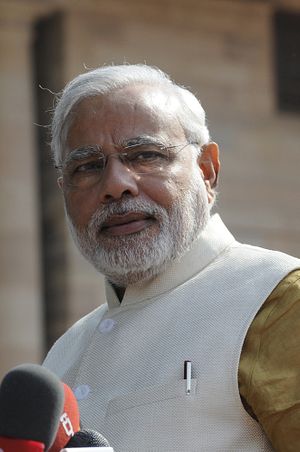For the longest time (and maybe still yet today), it was nigh impossible to come by a profile of Indian Prime Minister Narendra Modi, in both Indian and international media, that didn’t reference his alleged complicity in allowing 2002’s Hindu-on-Muslim religious riots in Godhra, Gujarat to take place. The riots, which claimed hundreds of (mostly Muslim) lives, came to define Modi’s political persona for his critics. While Modi seemed like the right man for the prime ministerial job given his economic chops, his Achille’s heel has long been his Hindu nationalist background and impulses.
Modi, once a member of the Rashtriya Swayamsevak Sangh (RSS), a radical Hindu social organization, polarized views leading up to his election last May. His economic bona fides, as impressive as they might have been in Gujarat, failed to impress those concerned about his views on religious freedom and Hindu preeminence in Indian society. Even the growth-rate obsessed Economist refused to endorse Gujarat’s economic miracle worker in India’s general election due to his murky history on religious freedom.
This context is important in light of Modi’s somewhat groundbreaking speech this week in New Delhi. Following several episodes of Hindu-on-minority religion violence and abuse in India, including forced conversions, desecrations, and vandalism, Modi finally spoke up in defense of religious freedom in India. Since his ascent to India’s top political office, Modi has remained tight-lipped on these issues, raising concerns among his critics and supporters alike. Speaking at an event organized by New Delhi’s Christian community, Modi promisedin no uncertain terms to punish religious violence and intolerance.
He noted that his government does not and would not “accept violence against any religion, on any pretext,” and would “not allow any religious group, belonging to the minority or the majority, to incite hatred against others, overtly or covertly.” “I strongly condemn such violence. My government will act strongly in this regard,” he added. Modi, who heads the Hindu nationalist and fiscally center-right Bharatiya Janata Party, risked alienating his more radical supporters with his speech. The RSS, for example, though primarily seen as a social organization, has been linked to communal violence in India in the past. Though Modi’s speech was applauded, even by his critics in India’s opposition, for supporting India’s pluralistic fabric, it will be taken as a warning by more radical Hindu groups under the umbrella of the Sangh Parivar.
Interestingly, several observers have noted the timing of Modi’s speech on religious freedom, which occurred mere weeks after U.S. President Barack Obama made a similar appeal before an Indian audience during his late-January visit to India. Tanvi Madan, who heads the Brookings Institution’s India project, tweeted a comparison of the language in Modi’s speech to Obama’s speech. Thematically, Modi touched on almost every point on religious freedom raised by the U.S. president. Skeptics of the prime minister’s sincerity on religious freedom have claimed that the speech was a token attempt to appease international audiences. Indeed, until the Modi administration acts against instances of Hindu chauvinism, many of these skeptics will remain unsatisfied.
The speech, in many ways, was an uncomfortable ordeal for a prime minister who wants to be seen primarily as a leader zeroed in on development and nothing but development. Indeed, Modi, in the conclusion to his speech, reminded his audience of his “vision of a Modern India” focusing on development. “My mantra is development,” he reiterated (mantra, perhaps, was a poorly chosen word, evoking Vedic hymnals). Interestingly, Modi switched to English from Hindi for the conclusion of his speech:
“In simple terms it means food on every table, every child in school, a job for everybody and a house with toilet and electricity for every family. This will make India proud. We can achieve this through unity. Unity strengthens us. Division weakens us. I sincerely request all Indians, and all of you present here to support me in this huge task.”
In reacting to Modi’s speech, the Indian media has taken it on itself to decipher the prime minister’s conscience, attempting to detect the extent to which Modi remains a committed Hindu nationalist. While I can’t pretend to have any expertise on this matter, it is clear that this speech will shift perceptions of the prime minister and his government slightly toward the center. Where India’s previous Congress-led government seized on the idea of secularism to claim an iron grip on India’s minority religion constituencies, Modi is content to keep his party’s radicals in check.
No one realistically expected the protection of religious freedom, secularism, and pluralism to be the strong point of this government, and Modi’s speech could be the last we hear of this issue from India’s top political leadership for some time. At best, the Modi government should convert these words into action and actively defend India’s pluralistic identity. Alas, the BJP’s historic mandate in last year’s general election means that radical Hindu groups and their representatives within India’s government and legislature will continue to feel emboldened. The prime minister, despite his personal views on these matters, should distance himself and keep his eyes set on governance, development, and, above all, unity.































